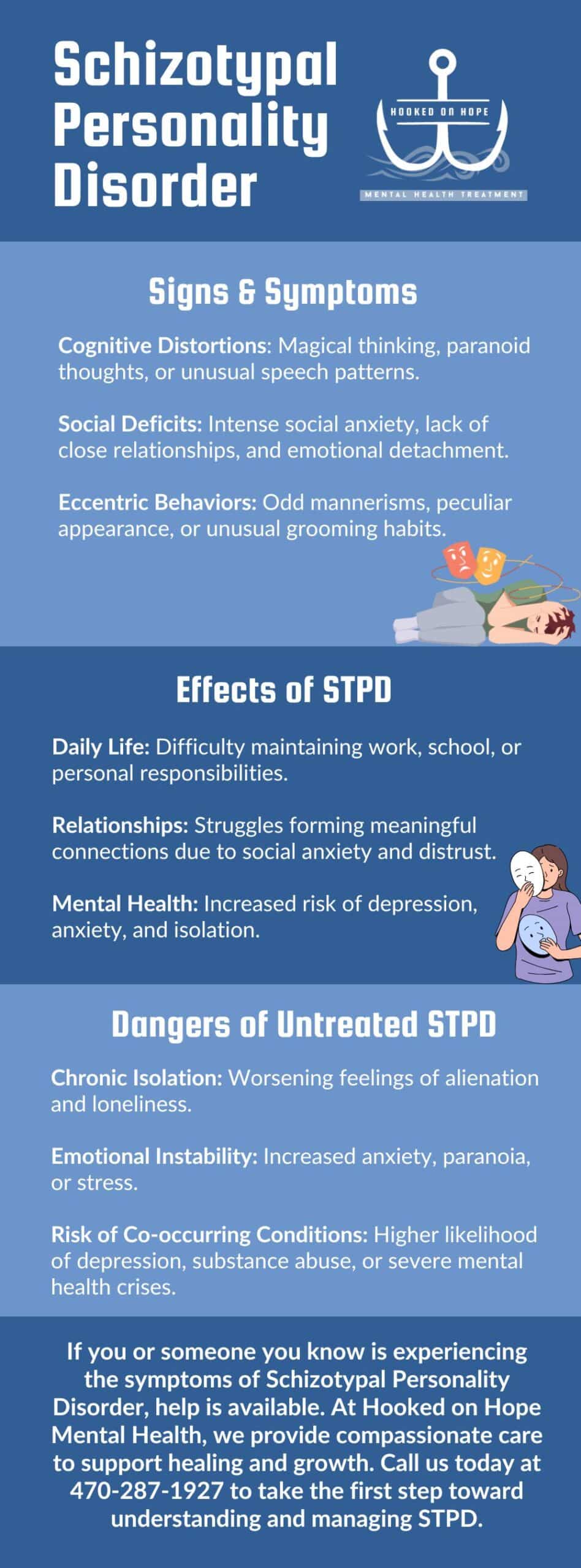Schizotypal Personality Disorder (STPD) is a lesser-known but significant mental health condition that affects how individuals think, perceive, and interact with others. Unlike other personality disorders, STPD is characterized by severe social anxiety, distorted thinking, and eccentric behaviors, making it challenging for those affected to form meaningful relationships and navigate everyday social interactions. This comprehensive guide aims to provide a deep understanding of Schizotypal Personality Disorder, covering its symptoms, causes, risk factors, diagnosis, and treatment options to support individuals and their loved ones in seeking the necessary help.
What is Schizotypal Personality Disorder?
Schizotypal Personality Disorder is a mental health condition classified under Cluster A personality disorders, which are known for their odd or eccentric behaviors. Individuals with STPD exhibit a pervasive pattern of social and interpersonal deficits marked by acute discomfort in close relationships, cognitive or perceptual distortions, and eccentricities in behavior.
People with STPD often appear odd or peculiar to others due to their unusual beliefs, magical thinking, and eccentric mannerisms. While they may desire close relationships, their intense social anxiety and distorted thinking patterns often hinder their ability to form and maintain these connections. Unlike schizophrenia, STPD does not typically involve severe psychotic symptoms such as hallucinations or delusions, but the cognitive distortions can resemble mild psychotic experiences.
Understanding STPD is crucial for recognizing its impact on individuals’ lives and providing the appropriate support and treatment to help them lead fulfilling lives.
Symptoms of Schizotypal Personality Disorder
Recognizing the symptoms of Schizotypal Personality Disorder is essential for early intervention and effective management.
The symptoms of STPD are diverse and can vary in intensity, but they generally fall into several key categories:
Cognitive and Perceptual Distortions
Individuals with STPD often experience unusual thought patterns and perceptual experiences that set them apart from others.
These may include:
- Magical Thinking: Believing in supernatural influences or having unfounded beliefs in special powers.
- Odd Speech Patterns: Using vague, metaphorical, or overly elaborate language that can be difficult for others to understand.
- Paranoid Ideation: Persistent mistrust or suspicion of others’ motives without substantial evidence.
Social and Interpersonal Deficits
People with STPD struggle with social interactions and forming close relationships due to their discomfort and unusual behaviors:
- Social Anxiety: Intense fear of social situations and being judged or scrutinized by others.
- Lack of Close Friends: Limited interest in forming deep, meaningful relationships outside of immediate family.
- Inappropriate or Constricted Affect: Displaying emotions that are out of sync with the situation or appearing emotionally flat.
Eccentric Behavior and Appearance
Eccentricities in behavior and appearance are common in STPD, making individuals seem unusual to others:
- Unusual Dress or Grooming: Wearing odd or outdated clothing and maintaining unconventional personal grooming habits.
- Behavioral Oddities: Exhibiting peculiar mannerisms, such as excessive hand movements or peculiar postures.
Distorted Thinking and Beliefs
Cognitive distortions can lead to misunderstandings and misinterpretations of reality:
- Ideas of Reference: Believing that insignificant remarks or events are directly related to them.
- Superstitions: Holding strong beliefs in luck or fate without rational basis.
- Perceived Control by External Forces: Feeling that external forces influence their thoughts and actions.
Anxiety and Emotional Distress
Chronic anxiety and emotional distress are prevalent among those with STPD:
- Chronic Feelings of Suspicion: Constantly feeling that others have malicious intentions.
- Emotional Instability: Fluctuating emotions that can lead to periods of intense distress.
These symptoms can significantly impact various aspects of life, including work, education, and personal relationships, making it essential to recognize and address them early.
Causes of Schizotypal Personality Disorder
The exact causes of Schizotypal Personality Disorder are not fully understood, but research suggests a combination of genetic, biological, and environmental factors contribute to its development:
Genetic Factors
Genetics play a significant role in the likelihood of developing STPD. Individuals with a family history of schizophrenia or other personality disorders are at a higher risk. Studies indicate that specific genes associated with schizophrenia may also be linked to schizotypal traits, suggesting a hereditary component to the disorder.
Neurobiological Factors
Differences in brain structure and function have been observed in individuals with STPD. Neuroimaging studies have shown abnormalities in areas of the brain responsible for social cognition, emotional regulation, and perception. These neurobiological variations may contribute to the cognitive and perceptual distortions characteristic of STPD.
Environmental Influences
Early life experiences and environmental factors can significantly impact the development of Schizotypal Personality Disorder:
- Childhood Trauma: Exposure to emotional neglect, abuse, or other traumatic experiences during childhood can increase the risk of developing STPD.
- Social Isolation: Growing up in an environment with limited social interaction or experiencing chronic loneliness can contribute to the social deficits seen in STPD.
- Cultural and Social Factors: Cultural norms and societal expectations can influence how symptoms manifest and are perceived, potentially exacerbating feelings of alienation.
Psychological Factors
Certain personality traits and coping mechanisms developed during childhood and adolescence may predispose individuals to STPD. For example, a tendency towards introversion, heightened sensitivity to social rejection, or maladaptive thought patterns can contribute to the development of schizotypal traits.
Risk Factors for Schizotypal Personality Disorder
Several risk factors can increase the likelihood of developing Schizotypal Personality Disorder. Understanding these factors can aid in early identification and intervention:
Family History
A significant risk factor for STPD is having a family member with a history of schizophrenia or another personality disorder. Genetic predisposition plays a crucial role in the development of schizotypal traits.
Early Childhood Experiences
Negative experiences during childhood, such as emotional neglect, abuse, or lack of nurturing, can contribute to the development of STPD. These experiences can affect the formation of healthy attachment styles and social skills.
Social Isolation
Chronic social isolation or limited social interaction during formative years can hinder the development of interpersonal skills, leading to difficulties in forming relationships and increased social anxiety.
Neurodevelopmental Factors
Abnormalities in brain development and function can predispose individuals to schizotypal traits. Neurodevelopmental disorders and variations in neurotransmitter systems may influence cognitive and perceptual processes associated with STPD.
Substance Abuse
Substance abuse, particularly during adolescence, can exacerbate or mimic symptoms of Schizotypal Personality Disorder. Chronic use of certain drugs can impair cognitive function and emotional regulation, increasing the risk of developing personality disorders.
Socioeconomic Factors
Living in environments with high levels of stress, instability, or limited access to mental health resources can increase the risk of developing STPD. Socioeconomic challenges can exacerbate feelings of alienation and hinder access to supportive services.
Diagnosing Schizotypal Personality Disorder
Diagnosing Schizotypal Personality Disorder involves a comprehensive evaluation by a mental health professional.
The process typically includes the following steps:
Clinical Interview
A thorough clinical interview is conducted to gather detailed information about the individual’s symptoms, personal history, and behavioral patterns. The clinician will explore the presence of key schizotypal traits and assess how they impact daily functioning and relationships.
Diagnostic Criteria
Diagnosis is based on the criteria outlined in the Diagnostic and Statistical Manual of Mental Disorders (DSM-5).
According to the DSM-5, a diagnosis of STPD requires a pervasive pattern of social and interpersonal deficits, along with cognitive or perceptual distortions and eccentric behaviors, as indicated by at least five of the following symptoms:
- Ideas of reference (excluding delusions of reference)
- Odd beliefs or magical thinking that influences behavior
- Unusual perceptual experiences, including bodily illusions
- Odd thinking and speech (e.g., vague, metaphorical, or overly elaborate)
- Suspiciousness or paranoid ideation
- Inappropriate or constricted affect
- Behavior or appearance that is odd, eccentric, or peculiar
- Lack of close friends or confidants other than first-degree relatives
- Excessive social anxiety that does not diminish with familiarity and tends to be associated with paranoid fears rather than negative judgments about self.
Psychological Assessments
Standardized psychological assessments and questionnaires may be used to evaluate schizotypal traits and differentiate STPD from other personality disorders or mental health conditions. These assessments help in quantifying the severity of symptoms and guiding treatment planning.
Rule Out Other Conditions
It’s essential to rule out other mental health disorders that may present with similar symptoms, such as schizophrenia, autism spectrum disorder, or other personality disorders. Differential diagnosis ensures that the individual receives the most accurate and effective treatment.

Can Schizotypal Personality Disorder be Cured?
While there is no cure for Schizotypal Personality Disorder, effective management and treatment can significantly improve symptoms and quality of life. Early intervention and comprehensive treatment strategies are crucial in helping individuals cope with and mitigate the impact of STPD.
Long-Term Management
With appropriate treatment, individuals with STPD can learn to manage their symptoms and develop healthier social interactions. Although the core personality traits may persist, the severity of symptoms can be reduced, allowing for improved functioning in various aspects of life.
Quality of Life
Effective treatment can enhance the overall quality of life by reducing anxiety, improving social skills, and increasing emotional regulation. Individuals may experience greater satisfaction in personal relationships and increased ability to engage in meaningful activities.
Treatment for Schizotypal Personality Disorder
Treatment for Schizotypal Personality Disorder typically involves a combination of psychotherapy, medication, and supportive interventions. The goal is to address both the schizotypal traits and any co-occurring mental health conditions, such as depression or anxiety.
Psychotherapy
Psychotherapy is the cornerstone of treatment for Schizotypal Personality Disorder, offering individuals a structured environment to explore and manage their symptoms.
Various therapeutic approaches are beneficial:
Cognitive Behavioral Therapy (CBT)
CBT helps individuals identify and modify distorted thought patterns and behaviors. By challenging magical thinking and paranoid ideation, CBT can reduce anxiety and improve social functioning. Techniques such as cognitive restructuring and exposure therapy can be particularly effective in addressing social anxiety and enhancing coping skills.
Psychodynamic Therapy
Psychodynamic therapy delves into the unconscious motivations and past experiences that shape current behavior. This approach helps individuals gain insight into their emotional and interpersonal difficulties, fostering a deeper understanding of their schizotypal traits. By exploring unresolved conflicts and emotional patterns, individuals can develop healthier ways of relating to others.
Social Skills Training
Social skills training focuses on enhancing interpersonal abilities and reducing social anxiety. Through role-playing, feedback, and practice, individuals learn effective communication, assertiveness, and conflict resolution skills. Improving these skills can lead to more meaningful and satisfying relationships, reducing feelings of isolation.
Group Therapy
Group therapy provides a supportive environment where individuals can share experiences and receive feedback from peers facing similar challenges. While some individuals with STPD may find group settings intimidating, with proper facilitation, group therapy can foster a sense of community and reduce feelings of alienation.
Medication
Medication is not the primary treatment for Schizotypal Personality Disorder, but it can be beneficial in managing specific symptoms or co-occurring conditions:
Antipsychotics
Low-dose antipsychotic medications can help reduce paranoid ideation and odd beliefs. These medications can alleviate severe symptoms and improve overall functioning.
Antidepressants
Selective serotonin reuptake inhibitors (SSRIs) and other antidepressants can be prescribed to manage depression and anxiety, which are common in individuals with STPD. By addressing these symptoms, antidepressants can enhance the effectiveness of psychotherapy.
Mood Stabilizers
In some cases, mood stabilizers may be used to manage emotional instability and reduce irritability. These medications can help individuals maintain a more consistent mood, improving their ability to engage in treatment and daily activities.
Supportive Interventions
Supportive interventions complement psychotherapy and medication by addressing the broader aspects of an individual’s well-being:
Psychoeducation
Psychoeducation involves teaching individuals and their families about Schizotypal Personality Disorder, its symptoms, and treatment options. Understanding the disorder can reduce stigma, improve communication, and foster a supportive environment.
Occupational Therapy
Occupational therapy helps individuals develop skills for daily living and work-related tasks. By enhancing vocational skills and promoting independence, occupational therapy can improve overall functioning and self-esteem.
Family Therapy
Family therapy addresses the dynamics and interactions within the family that may contribute to or be affected by STPD. By improving communication and reducing conflict, family therapy can support the individual’s recovery and strengthen relationships.
Lifestyle Adjustments
Incorporating healthy lifestyle changes can support overall mental health and complement formal treatment:
Routine Establishment
Creating a structured daily routine can provide a sense of stability and predictability, reducing anxiety and improving functioning. Regular schedules for meals, exercise, work, and leisure activities can help individuals manage their time effectively.
Mindfulness and Relaxation Techniques
Practicing mindfulness, meditation, or yoga can help individuals stay grounded and manage stress. These techniques promote emotional regulation and enhance self-awareness, making it easier to cope with schizotypal symptoms.
Healthy Lifestyle Choices
Maintaining a balanced diet, engaging in regular physical activity, and ensuring adequate sleep are essential for mental and physical well-being. Avoiding excessive caffeine, alcohol, and recreational drugs can also improve overall health and reduce anxiety.

Supporting a Loved One with Schizotypal Personality Disorder
Supporting someone with Schizotypal Personality Disorder requires empathy, patience, and understanding.
Here are ways to provide meaningful support:
Encourage Professional Help
Gently encourage your loved one to seek professional help. Offer to assist them in finding a therapist or accompany them to appointments if they feel comfortable with it. Emphasize that seeking help is a sign of strength and a step toward improving their quality of life.
Respect Their Need for Space
Individuals with STPD often value their solitude and personal space. Respect their boundaries and avoid pushing them into social situations they find uncomfortable. Allow them to set the pace for social interactions and support them in finding activities that align with their interests.
Provide Emotional Support
Offer a listening ear and validate their feelings without judgment. Let them know that you are there for them and that their experiences are valid. Simple gestures of kindness and understanding can make a significant difference in their sense of connection and well-being.
Educate Yourself
Learn about Schizotypal Personality Disorder to better understand your loved one’s experiences and challenges. Knowledge about the disorder can help you provide informed support and reduce misunderstandings.
Foster a Supportive Environment
Create a safe and supportive environment where your loved one feels comfortable expressing themselves. Encourage open communication and avoid criticism or negative judgments. A nurturing environment can help them feel more secure and willing to engage in treatment.
Encourage Social Interaction
While respecting their need for solitude, gently encourage social interaction in a way that feels manageable for them. Suggest low-pressure activities or one-on-one interactions that align with their comfort level, helping them build social skills and reduce isolation.
Be Patient
Recovery and improvement in managing STPD symptoms take time. Be patient with their progress and avoid expecting immediate changes. Celebrate small victories and provide consistent support throughout their journey.
Take Care of Yourself
Supporting someone with STPD can be emotionally demanding. Ensure that you are also taking care of your own mental and emotional well-being. Seek support from friends, family, or a mental health professional if needed to prevent burnout and maintain your ability to help others effectively.
Schizotypal Personality Disorder Treatment Atlanta, GA
Schizotypal Personality Disorder is a complex and often misunderstood condition that significantly impacts an individual’s ability to form relationships and express emotions. While it presents unique challenges, understanding the disorder and seeking appropriate treatment can lead to meaningful improvements in functioning and quality of life.
At Hooked on Hope Mental Health, we are dedicated to providing compassionate care and effective treatment options for individuals with Schizotypal Personality Disorder in Atlanta, GA. Our experienced team of mental health professionals is committed to supporting you or your loved one in overcoming the challenges of STPD and achieving personal growth and fulfillment.
If you or someone you know is struggling with symptoms of Schizotypal Personality Disorder, don’t hesitate to reach out to us at 470-287-1927 or fill out our online contact form today. Early intervention and comprehensive treatment can make a significant difference in managing symptoms and enhancing overall well-being. Let Hooked on Hope Mental Health guide you on the path to healing and a brighter future.







